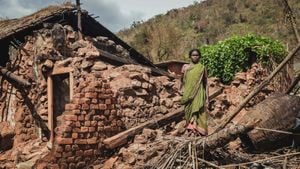The recently concluded G20 Summit held in Rio de Janeiro, Brazil, was filled with significant bilateral discussions, reflecting the complex interplay of international relationships amid globally pressing issues. With leaders from the world’s 20 largest economies convening, the summit served as not just a platform for dialogue but also as a stage for forging strategic alliances.
Among the notable bilateral meetings was the one between Chinese President Xi Jinping and Brazilian President Luiz Ignacio Lula da Silva. Before this meeting, Xi emphasized the bilateral cooperation between China and Brazil, particularly on international matters, including the ever-contentious issue of Ukraine. He applauded Brazil’s stance and called for enhanced synergy between China's Belt and Road Initiative and Brazil's development strategies. The two leaders expressed shared views on the war, underscoring the importance of collaboration to navigate such turbulent waters.
Meanwhile, Turkish President Recep Tayyip Erdogan had his own agenda during the summit. He approached President Lula with discussions aimed at strengthening ties between their two nations. Erdogan's meeting, set against the stunning backdrop of Copacabana Fortress, was focused on deepening the bilateral relations and addressing key global challenges. Highlighting Turkey's principled stance toward Israel, Erdogan praised Brazil’s commitment to advocating for peace, particularly its vocal opposition against Israeli military actions.
These dialogues point to broader themes present at the summit: global governance reform, cooperative peace efforts, and socio-economic development. Leaders discussed the need for restructuring international institutions to reflect the current geopolitical realities. Erdogan, for example, underlined Turkey's initiatives at the United Nations aiming to halt arms sales to Israel, thereby positioning itself as a regional power advocating for human rights.
Across the globe, turmoil had not strayed far from the proceedings; just days before the summit, Brazil faced shocking episodes of violence. The Brazilian Supreme Court was evacuated due to explosions near its premises, resulting sadly, in one death. These incidents sparked concern about security, not just for domestic citizens but also for the visiting international leaders.
While global leaders sought to strengthen economic ties, they also grappled with pressing issues on social policy. Brazil's launch of a social summit preceding the G20 discussions aimed to highlight the needs of low-income individuals, ensuring their voices were included alongside those of national leaders. This gathering was the first of its kind to incorporate civil society input directly before the summit, signaling Brazil's commitment to inclusive dialogue.
Such social initiatives also drew attention to how the G20, traditionally viewed as an assembly of powerful nations, could adapt its approach to welcome diverse perspectives, particularly from marginalized communities grappling with poverty and inequality. The summit was not just about agreements and declarations but reflected the pressing need for dialogue with everyday citizens affected by policies made at these levels.
The energy surrounding the G20 Summit also sparked debates about leadership dynamics and the future direction of global diplomacy. Amid discussions, the veracity of friendship among even those historically at odds was put to the test. For example, the exchanges between Indian Prime Minister Narendra Modi and various leaders, including U.S. President Joe Biden, demonstrated the balancing act of maintaining strategic partnerships amid competing national interests. Modi's participation highlighted India’s rising influence as it maneuvered through the intersection of global politics.
Critics of the G20 often argue about the group's effectiveness, raising concerns over fragmented agendas and outcomes. Yet, this summit showcased how discourse among nations can renew commitments to cooperative action and support for resolving present-day crises, such as the climate emergency, trade tensions, and public health situations stemming from the pandemic.
Following these discussions, the world watched closely as nations directed their focus back to their respective challenges. Summits such as these are quintessential for reinforcing alliances and forging new connections, but their effectiveness will be measured by the actions taken post-summit.
Overall, the G20 discussions in Rio de Janeiro underscored not only the interconnectedness of global leaders but also the pressing need for cooperative solutions across various challenges. The world is undoubtedly shifting, but whether it shifts toward equitable progress relies substantially on maintaining the dialogues initiated here at the summit.
While the summit has concluded, the conversations are anything but over. With political landscapes constantly changing, the ramifications of the G20 Summit will ripple outwards as each leader returns to their homeland. Whether these dialogues translate to substantial policy implementations remains to be seen.



